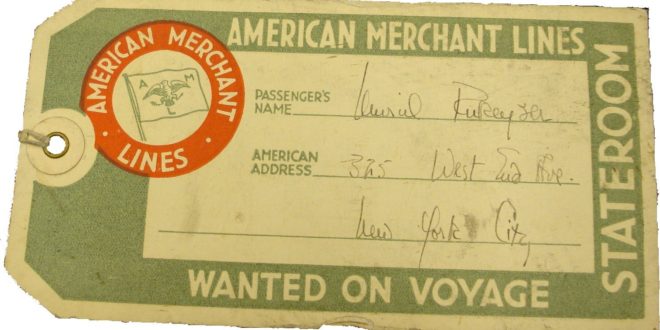Podcast: Play in new window | Download (Duration: 59:00 — 81.0MB)
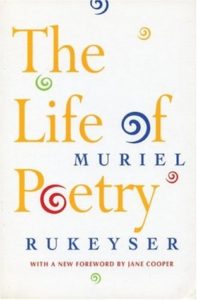 Today we feature the radical work of Muriel Rukeyser, whose poetics treatise, The Life of Poetry, first published in 1949, can be called an anti-Fascist manifesto. We struggle at times to place Rukeyser inside our understanding of politics and poetry as she herself struggled to not be placed – like Thoreau, she did not wish to be regarded as a member of any incorporated society which she had not joined. But I think we can say that Muriel Rukeyser was a committed antifascist, which is not a party, it is a way. And the way of poetry, not just of poems, is the way of anti-fascism.
Today we feature the radical work of Muriel Rukeyser, whose poetics treatise, The Life of Poetry, first published in 1949, can be called an anti-Fascist manifesto. We struggle at times to place Rukeyser inside our understanding of politics and poetry as she herself struggled to not be placed – like Thoreau, she did not wish to be regarded as a member of any incorporated society which she had not joined. But I think we can say that Muriel Rukeyser was a committed antifascist, which is not a party, it is a way. And the way of poetry, not just of poems, is the way of anti-fascism.
We’re listening to the Oscar Peterson Trio perform “Begone Dull Care,” the music composed for an experimental short animation film from 1949 wherein Evelyn Lambart and Norman McLaren painted colours, shapes, and transformations directly on to their filmstrip. The result is a vivid interpretation, in fluid lines and colour, of this jazz music. Peterson and Norman McLaren “worked together for four days developing the music. At times Peterson would play variations enabling McLaren to visualize colors and movements, and other times McLaren would describe specific music he wanted for a special effect.” [Valarie T. Richard’s Norman McLaren, Manipulator of Movement]
The rest of our music will feature Carmen McRae performing with The Dave Brubeck Quartet – the lyrics to these Brubeck compositions were composed by his wife Iola.
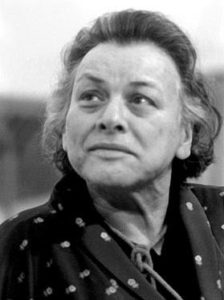 As I was thinking about the pieces I might bring together for today’s episode, beyond the guest interview, beyond the musical interludes, I began looking for audio of Rukeyser reading from her work, or commenting on poetry, talking about the life of poetry, the life of the poet, I first went to PennSound (PennSound is a poetry website and online archive that hosts free and downloadable recordings of poets reading their own work and is aa project of the Center for Programs in Contemporary Writing at the University of Pennsylvania) and there found several pieces to use. One in particular I’ll highlight right now. This is “In Our Time” from The Speed of Darkness:
As I was thinking about the pieces I might bring together for today’s episode, beyond the guest interview, beyond the musical interludes, I began looking for audio of Rukeyser reading from her work, or commenting on poetry, talking about the life of poetry, the life of the poet, I first went to PennSound (PennSound is a poetry website and online archive that hosts free and downloadable recordings of poets reading their own work and is aa project of the Center for Programs in Contemporary Writing at the University of Pennsylvania) and there found several pieces to use. One in particular I’ll highlight right now. This is “In Our Time” from The Speed of Darkness:
In our period, they say there is free speech.
They say there is no penalty for poets,
There is no penalty for writing poems.
They say this. This is the penalty.
This short poem is used as an epigraph by poet Charles Bernstein in an essay from 1994 called “How Poetry Survives.” He writes that “the negative economy of poetry [that is, that poetry is published at a loss] is what makes it such a great asset for our culture in that it provides an alternative system of valuation to the bureaucratic professionalism of the academy and to the commercialism of the book industry and art world, not to mention the TV and movie industries.” That bureaucratic professional is called “the middleman” by Muriel Rukeyser. Bernstein goes on to write that much of publishing exists not for economic profit but for cultural hegemony – what is published (and Bernstein notes, what is produced as entertainment), then, seeks to limit our ability to imagine our ways of being. This piece by Bernstein is “in the spirit” and nearly the letter of Muriel Rukeyser’s The Life of Poetry.
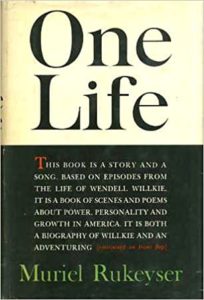 Muriel Rukeyser wrote in many genres and forms and her books have won awards and been ignored, she has been praised and scorned often in the same breath and even by friends. She dared to write “unpoetically” – being among the first to write a kind of documentary verse with her best-known poem sequence “The Book of the Dead”; she transgressed by writing books about men and subjects that she had “no right to” according to the male experts in those fields; she wrote books that still confound us as readers today, like her verse biography of Wendell Willkie One Life. If nothing else Muriel Rukeyser was and is a challenge.
Muriel Rukeyser wrote in many genres and forms and her books have won awards and been ignored, she has been praised and scorned often in the same breath and even by friends. She dared to write “unpoetically” – being among the first to write a kind of documentary verse with her best-known poem sequence “The Book of the Dead”; she transgressed by writing books about men and subjects that she had “no right to” according to the male experts in those fields; she wrote books that still confound us as readers today, like her verse biography of Wendell Willkie One Life. If nothing else Muriel Rukeyser was and is a challenge.
To be sure the criticism against her was often simply misogynist and perhaps as much a response to her openly fluid sexuality, a sexuality much like Carmen McRae’s.
GUEST
 Eric Keenaghan is an associate professor of English in the SUNY system at Albany. He’s currently at work editing The Usable Truth and Other Selected Prose, a collection that recovers some of Rukeyser’s forgotten or suppressed shorter-form nonfiction including her essays, journalism, activist writings, and lectures. A piece from this volume, the previously unpublished essay “Many Keys,” written in 1957, recently appeared in Feminist Modernist Studies.
Eric Keenaghan is an associate professor of English in the SUNY system at Albany. He’s currently at work editing The Usable Truth and Other Selected Prose, a collection that recovers some of Rukeyser’s forgotten or suppressed shorter-form nonfiction including her essays, journalism, activist writings, and lectures. A piece from this volume, the previously unpublished essay “Many Keys,” written in 1957, recently appeared in Feminist Modernist Studies.
RELATED
Muriel Rukeyser at PennSound
The Life of Poetry, Chapter 1
A Place to Live (1941 film)
Grandeur and Misery of a Poster Girl – R. S. P. (The Partisan Review, 1943)
The Rukeyser Imbroglio – Rebecca Pitts (The Partisan Review, 1944)
“Fear of Poetry” by Eileen Myles (The Nation. April 14, 1997)
“How Poetry Survives” by Charles Bernstein
Total Imaginative Response: Five Undergraduate Studies from “The Lives of Muriel Rukeyser” by Eric Keenaghan
Primitive Biographies by Eric Keenaghan
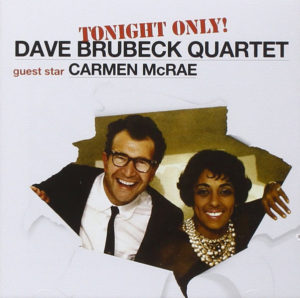 MUSIC
MUSIC
“Begone Dull Care” by The Oscar Peterson Trio (1949)
“Strange Meadowlark” by The Dave Brubeck Quartet with Carmen McRae (Tonight Only!)
“My One Bad Habit” by The Dave Brubeck Quartet with Carmen McRae (Tonight Only!)
“Take Five” by The Dave Brubeck Quartet with Carmen McRae (Take Five Live)
CREDITS
Producer & Host: Doug Storm
Executive Producer: Kade Young
 WFHB Bloomington Community Radio
WFHB Bloomington Community Radio
